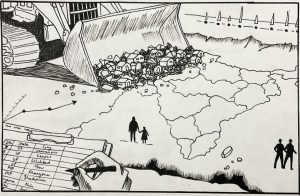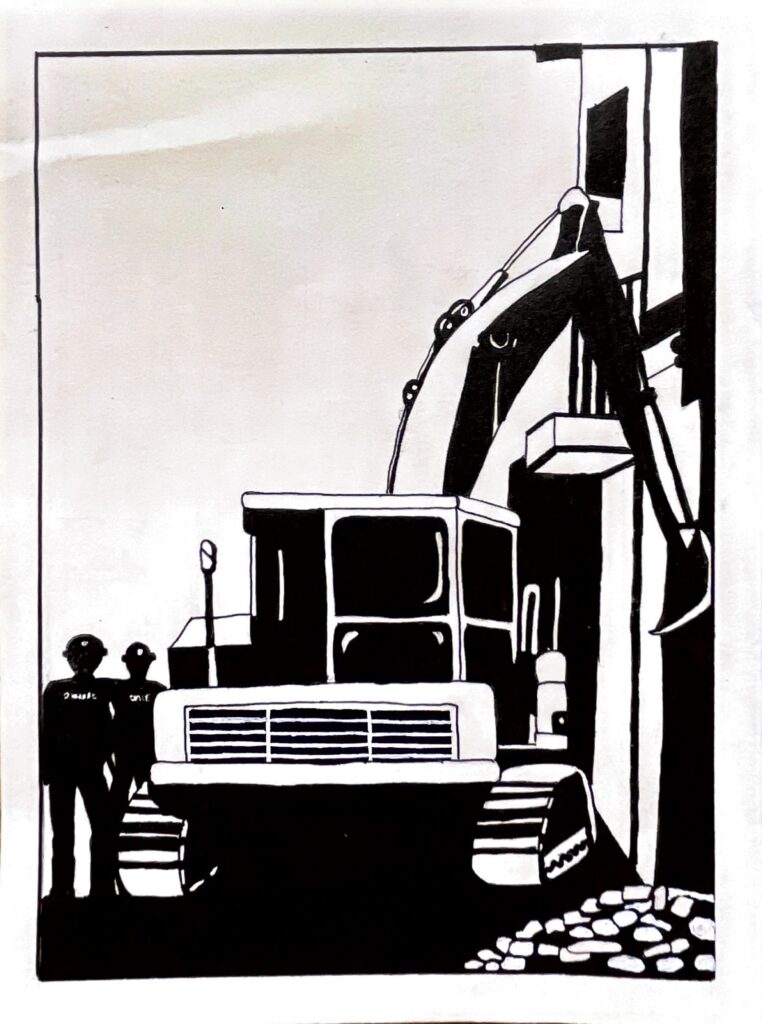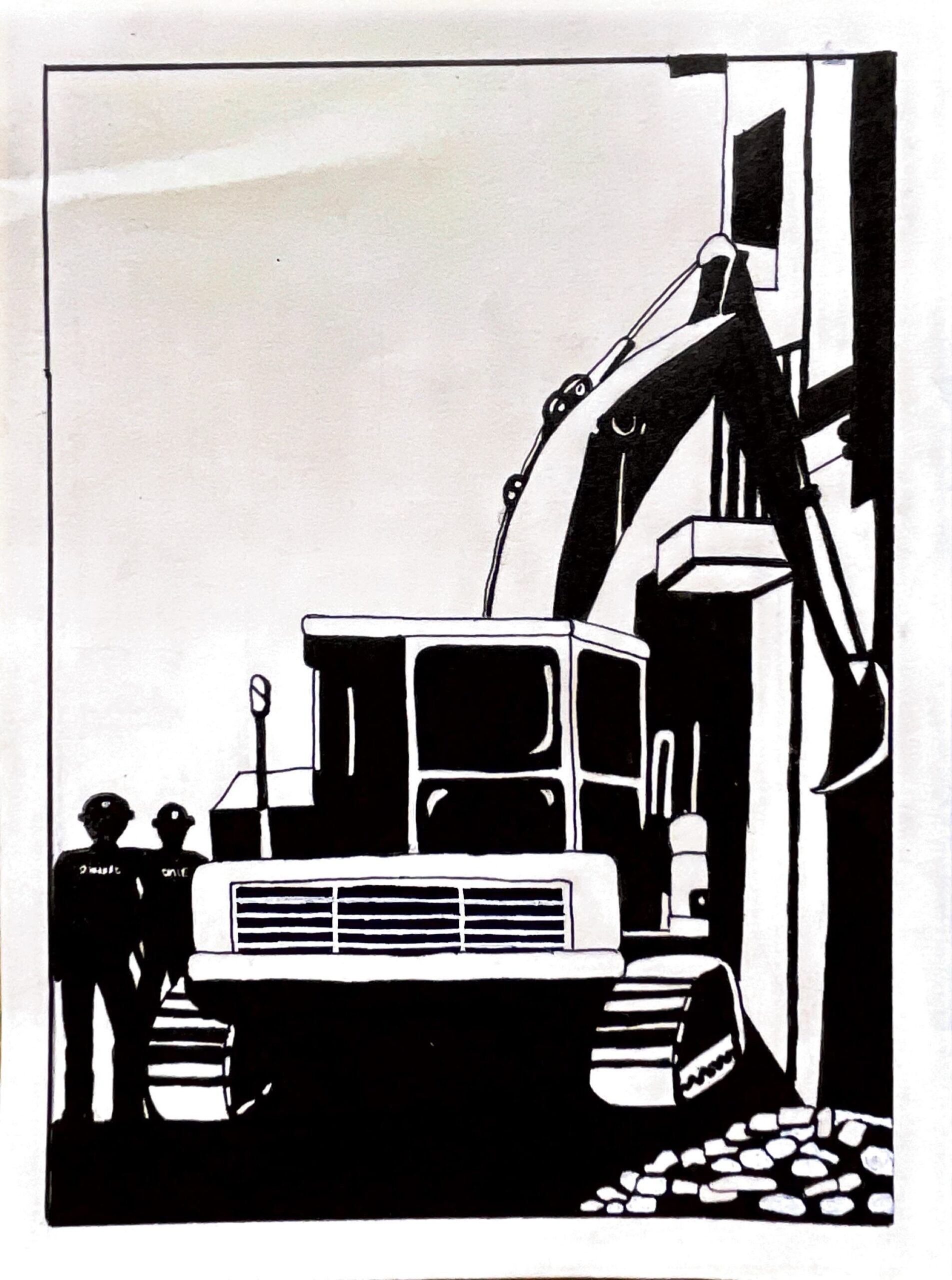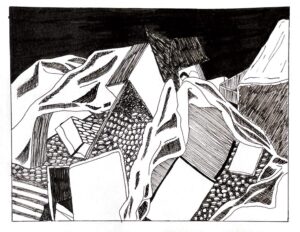
Muzzammil Chowdhary was wrongfully arrested while his family’s rented home was demolished

On 11 June 2022, the Saharanpur Development Authority (SDA) sent bulldozers to demolish two homes in the Khatakheri area under the guise of targeting “rioters.” The first belonged to the family of Muzzammil Chowdhary, a 17-year-old boy at the time, who was detained the previous day without a warrant, wrongfully accused of leading a protest in the northern Uttar Pradesh district. While the bulldozer then moved on to Mohammed Bilal’s house, the fate of Muzzammil’s family remained equally devastating. While Muzzammil remained held in custody, a bulldozer rolled into his locality, heading straight for his family’s rented home, without any warning, notice, or reason.
Nupur Sharma’s inflammatory remarks against Prophet Mohammed sparked outrage that led to protests in several cities across Uttar Pradesh. How the protests turned into a clash has become a puzzle with different versions of the events being narrated by the residents of the city. But it was in response to these developments that 17-year-old Muzzammil was arbitrarily detained on 10 June, and subsequently arrested, after being identified near the clock tower area where an alleged clash between the police and the protestors took place. His family learned about his detention from neighborhood boys who witnessed it. His elderly mother rushed to the local police station, leaving behind his father and two sisters at home.
It was during her absence that the demolition took place. Without a word of explanation or warning, the massive bulldozer began tearing down the property’s gate. The neighborhood watched in stunned silence until someone alerted the police that the house did not even belong to Muzzammil or his family—it was owned by someone else, who had rented it out to Muzzammul’s family. By then, however, the damage had been done.
Muzzammil’s family had only been living in the house for a year, but they had become familiar with it. His father, still shaken, recounted the ordeal: “Bulldozer bina kisi notice aur bina kisi warning ke aaya, ekdam dar ka mahaul hogaya tha. Aaj bhi main ne saare kagaz sambhal kar rakhe hain—documents, todhi gayi gate ki tasveerein, diye gaye kagaz aur iske rihaai ke order.” (The bulldozer came without notice, without warning, and left our family terrified. Even now, I keep everything from that time—documents, photos of the gate they broke, the papers they served, his release orders.) Muzammil’s sisters listened in as their father and brother narrated the incident. The old man had soft moist eyes, almost holding back tears as he and his young son recalled their ordeal.
The SDA later served a backdated notice to justify their actions, in an attempt to cover up an incident steeped in illegality and intimidation. Babr Mudassir, Muzammil’s lawyer, condemned the demolition as “an act of punitive terror, to give out a message.” The lawyer noted that no legal framework supports this type of extrajudicial punishment, while emphasising that Muzammil’s family was living on rent. He added that Muzammil was a juvenile at the time, so it is bizarre in itself that the police accused him of leading the protests—even in the mainstream media, news reports cited his name as if he were a notorious criminal.
A family left to pick up the pieces
Muzzammil’s family, struggling to make ends meet, faced grave and immediate consequences of the accusations against the 16-year-old and the punitive bulldozer violence. The landlord and his wife—who were out of town at the time—were furious and demanded that the family vacate the premises. The wife, who requested not to be identified, later revealed her own trauma surrounding the incident. She recalled being terrified when she heard that a bulldozer had reached the house that she and her husband built by putting all their money over the years. They didn’t know if the entire house was gone. Even now, they live in fear: “What if the police come back?” They built that house for temporary rentals, but never expected something like this. The owners have since shifted back to Saharanpur and live in their house.
Fear of further action and their landlord’s ill-temper forced Muzammil’s family to move to another rented two-room house nearby, incurring financial and emotional strain. Despite their limited means, they replaced the broken gate as a gesture of goodwill toward their former landlord.
Muzammil’s family bore the brunt of the upheaval, trying to stabilise themselves economically while fighting for their son’s release. After over six months of separation, Muzzammil finally returned home. His father described the ordeal as a test of faith. “Sirf Allah ne humein is museebat se nikalne mein madad ki, koi madad karne aage nahi aaya, lekin kisi bhi parivaar ko is tarah ke haalaat ka samna na karna pade.” (Allah helped us through it, no one came forward to help us, but no family should ever have to go through this.) The psychological toll on those affected is immeasurable as the entire family feels disturbed and now lives in fear.
Two years on, the eeriness of the incident is still alive as one walks around the neighbourhood with Muzammil, who still gets strange looks from people on the street. Their neighbours in Khata Kheri fear that they might be linked to the family and their house might be targeted next. One neighbor remarked, “Aaj ke samay mein India mein Musalman ko nishana banaya ja raha hai, chahe unhone koi jurm na kiya ho. Hum jo kuch bhi banaya hai, hamko bhi to apni family dekhni hai, sab khatre me kasie daalde” (In today’s time in India, Muslims are being targeted, even if they commit no crime, we also have to take care of our family, how can we risk everything we have built.) The ostracisation by the neighbourhood has only deepened the isolation felt by Muzammil’s family.
Muzzammil, now an aspiring lawyer, reflected on his arrest and its aftermath with resolve. “Chahe main protest mein hota bhi—jo ki main nahi tha—phir bhi jo unhone kiya woh unconstitutional tha. Iss desh mein kanoon hai. Mujhe bina kisi wajah ke, bina warrant ke giraftaar kiya gaya. Yeh humein chhota mehsoos karane ki koshish thi.” (Even if I had been at the protest—which I wasn’t—what they did was unconstitutional. There are laws in this country. I was arrested without any reason, without a warrant. It was an attempt to make us feel small.)
Despite being in prison at such a young age, Muzammil has not turned bitter. He remains undeterred, vowing to use his experience to fight for justice. “Constitution humein suraksha deta hai, mai isilie LLB karna chahta hu taki is tarah law ka misuse na ho.” (The Constitution protects us. That’s why I want to pursue an LLB, so that such misuse of the law does not happen.)
The Saharanpur police’s actions that day followed a disturbing pattern of demolitions that target Muslim families, executed without due process. In both Muzzammil’s and Bilal’s cases, the bulldozer demolished their homes only because one of the inhabitants were accused of being part of a protest. The action was carried out without notice or time for the families to vacate, leaving children, women, and elderly members inside. These actions appear designed to terrorise, rather than enforce law and order.
The backdated demolition notices reveal an attempt to manufacture legitimacy where none existed. These demolitions served not only as tools of state violence but also as symbolic warnings—enforcing submission through fear. The lawyer Mudassir also revealed that all the men accused in the case in which Muzzammil was arrested received a similar backdated notice for demolition, which the families challenged at the SDA. The SDA has not taken any action on the notices it issued but has not retracted the notices as well. In the face of such injustices, voices like Muzzammil’s are a reminder of the resilience of those determined to seek accountability. For him, the ordeal is not just a story of victimisation but a rallying cry for justice and constitutionalism.
Related Posts
Muzzammil Chowdhary was wrongfully arrested while his family’s rented home was demolished

On 11 June 2022, the Saharanpur Development Authority (SDA) sent bulldozers to demolish two homes in the Khatakheri area under the guise of targeting “rioters.” The first belonged to the family of Muzzammil Chowdhary, a 17-year-old boy at the time, who was detained the previous day without a warrant, wrongfully accused of leading a protest in the northern Uttar Pradesh district. While the bulldozer then moved on to Mohammed Bilal’s house, the fate of Muzzammil’s family remained equally devastating. While Muzzammil remained held in custody, a bulldozer rolled into his locality, heading straight for his family’s rented home, without any warning, notice, or reason.
Nupur Sharma’s inflammatory remarks against Prophet Mohammed sparked outrage that led to protests in several cities across Uttar Pradesh. How the protests turned into a clash has become a puzzle with different versions of the events being narrated by the residents of the city. But it was in response to these developments that 17-year-old Muzzammil was arbitrarily detained on 10 June, and subsequently arrested, after being identified near the clock tower area where an alleged clash between the police and the protestors took place. His family learned about his detention from neighborhood boys who witnessed it. His elderly mother rushed to the local police station, leaving behind his father and two sisters at home.
It was during her absence that the demolition took place. Without a word of explanation or warning, the massive bulldozer began tearing down the property’s gate. The neighborhood watched in stunned silence until someone alerted the police that the house did not even belong to Muzzammil or his family—it was owned by someone else, who had rented it out to Muzzammul’s family. By then, however, the damage had been done.
Muzzammil’s family had only been living in the house for a year, but they had become familiar with it. His father, still shaken, recounted the ordeal: “Bulldozer bina kisi notice aur bina kisi warning ke aaya, ekdam dar ka mahaul hogaya tha. Aaj bhi main ne saare kagaz sambhal kar rakhe hain—documents, todhi gayi gate ki tasveerein, diye gaye kagaz aur iske rihaai ke order.” (The bulldozer came without notice, without warning, and left our family terrified. Even now, I keep everything from that time—documents, photos of the gate they broke, the papers they served, his release orders.) Muzammil’s sisters listened in as their father and brother narrated the incident. The old man had soft moist eyes, almost holding back tears as he and his young son recalled their ordeal.
The SDA later served a backdated notice to justify their actions, in an attempt to cover up an incident steeped in illegality and intimidation. Babr Mudassir, Muzammil’s lawyer, condemned the demolition as “an act of punitive terror, to give out a message.” The lawyer noted that no legal framework supports this type of extrajudicial punishment, while emphasising that Muzammil’s family was living on rent. He added that Muzammil was a juvenile at the time, so it is bizarre in itself that the police accused him of leading the protests—even in the mainstream media, news reports cited his name as if he were a notorious criminal.
A family left to pick up the pieces
Muzzammil’s family, struggling to make ends meet, faced grave and immediate consequences of the accusations against the 16-year-old and the punitive bulldozer violence. The landlord and his wife—who were out of town at the time—were furious and demanded that the family vacate the premises. The wife, who requested not to be identified, later revealed her own trauma surrounding the incident. She recalled being terrified when she heard that a bulldozer had reached the house that she and her husband built by putting all their money over the years. They didn’t know if the entire house was gone. Even now, they live in fear: “What if the police come back?” They built that house for temporary rentals, but never expected something like this. The owners have since shifted back to Saharanpur and live in their house.
Fear of further action and their landlord’s ill-temper forced Muzammil’s family to move to another rented two-room house nearby, incurring financial and emotional strain. Despite their limited means, they replaced the broken gate as a gesture of goodwill toward their former landlord.
Muzammil’s family bore the brunt of the upheaval, trying to stabilise themselves economically while fighting for their son’s release. After over six months of separation, Muzzammil finally returned home. His father described the ordeal as a test of faith. “Sirf Allah ne humein is museebat se nikalne mein madad ki, koi madad karne aage nahi aaya, lekin kisi bhi parivaar ko is tarah ke haalaat ka samna na karna pade.” (Allah helped us through it, no one came forward to help us, but no family should ever have to go through this.) The psychological toll on those affected is immeasurable as the entire family feels disturbed and now lives in fear.
Two years on, the eeriness of the incident is still alive as one walks around the neighbourhood with Muzammil, who still gets strange looks from people on the street. Their neighbours in Khata Kheri fear that they might be linked to the family and their house might be targeted next. One neighbor remarked, “Aaj ke samay mein India mein Musalman ko nishana banaya ja raha hai, chahe unhone koi jurm na kiya ho. Hum jo kuch bhi banaya hai, hamko bhi to apni family dekhni hai, sab khatre me kasie daalde” (In today’s time in India, Muslims are being targeted, even if they commit no crime, we also have to take care of our family, how can we risk everything we have built.) The ostracisation by the neighbourhood has only deepened the isolation felt by Muzammil’s family.
Muzzammil, now an aspiring lawyer, reflected on his arrest and its aftermath with resolve. “Chahe main protest mein hota bhi—jo ki main nahi tha—phir bhi jo unhone kiya woh unconstitutional tha. Iss desh mein kanoon hai. Mujhe bina kisi wajah ke, bina warrant ke giraftaar kiya gaya. Yeh humein chhota mehsoos karane ki koshish thi.” (Even if I had been at the protest—which I wasn’t—what they did was unconstitutional. There are laws in this country. I was arrested without any reason, without a warrant. It was an attempt to make us feel small.)
Despite being in prison at such a young age, Muzammil has not turned bitter. He remains undeterred, vowing to use his experience to fight for justice. “Constitution humein suraksha deta hai, mai isilie LLB karna chahta hu taki is tarah law ka misuse na ho.” (The Constitution protects us. That’s why I want to pursue an LLB, so that such misuse of the law does not happen.)
The Saharanpur police’s actions that day followed a disturbing pattern of demolitions that target Muslim families, executed without due process. In both Muzzammil’s and Bilal’s cases, the bulldozer demolished their homes only because one of the inhabitants were accused of being part of a protest. The action was carried out without notice or time for the families to vacate, leaving children, women, and elderly members inside. These actions appear designed to terrorise, rather than enforce law and order.
The backdated demolition notices reveal an attempt to manufacture legitimacy where none existed. These demolitions served not only as tools of state violence but also as symbolic warnings—enforcing submission through fear. The lawyer Mudassir also revealed that all the men accused in the case in which Muzzammil was arrested received a similar backdated notice for demolition, which the families challenged at the SDA. The SDA has not taken any action on the notices it issued but has not retracted the notices as well. In the face of such injustices, voices like Muzzammil’s are a reminder of the resilience of those determined to seek accountability. For him, the ordeal is not just a story of victimisation but a rallying cry for justice and constitutionalism.
SUPPORT US
We like bringing the stories that don’t get told to you. For that, we need your support. However small, we would appreciate it.





